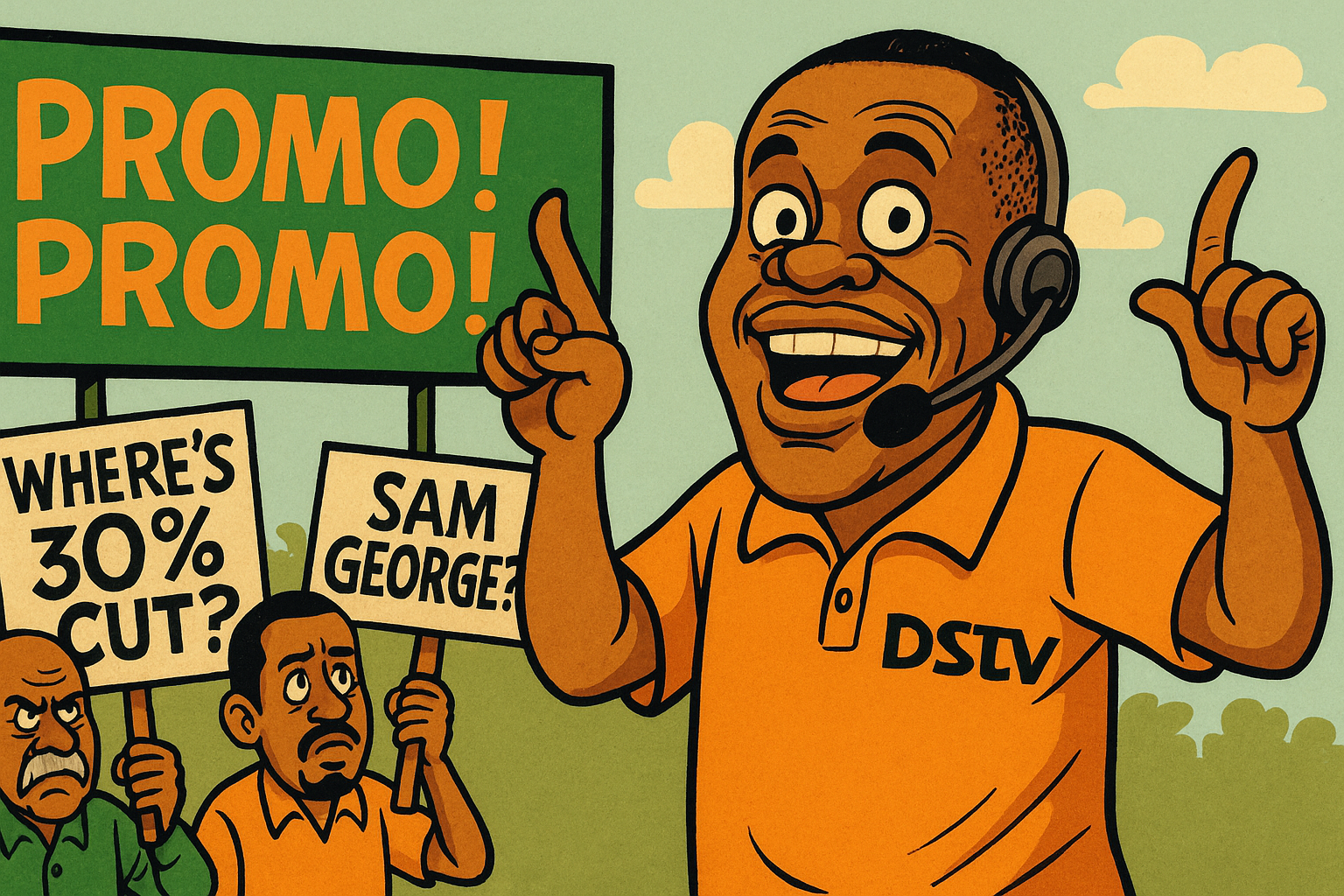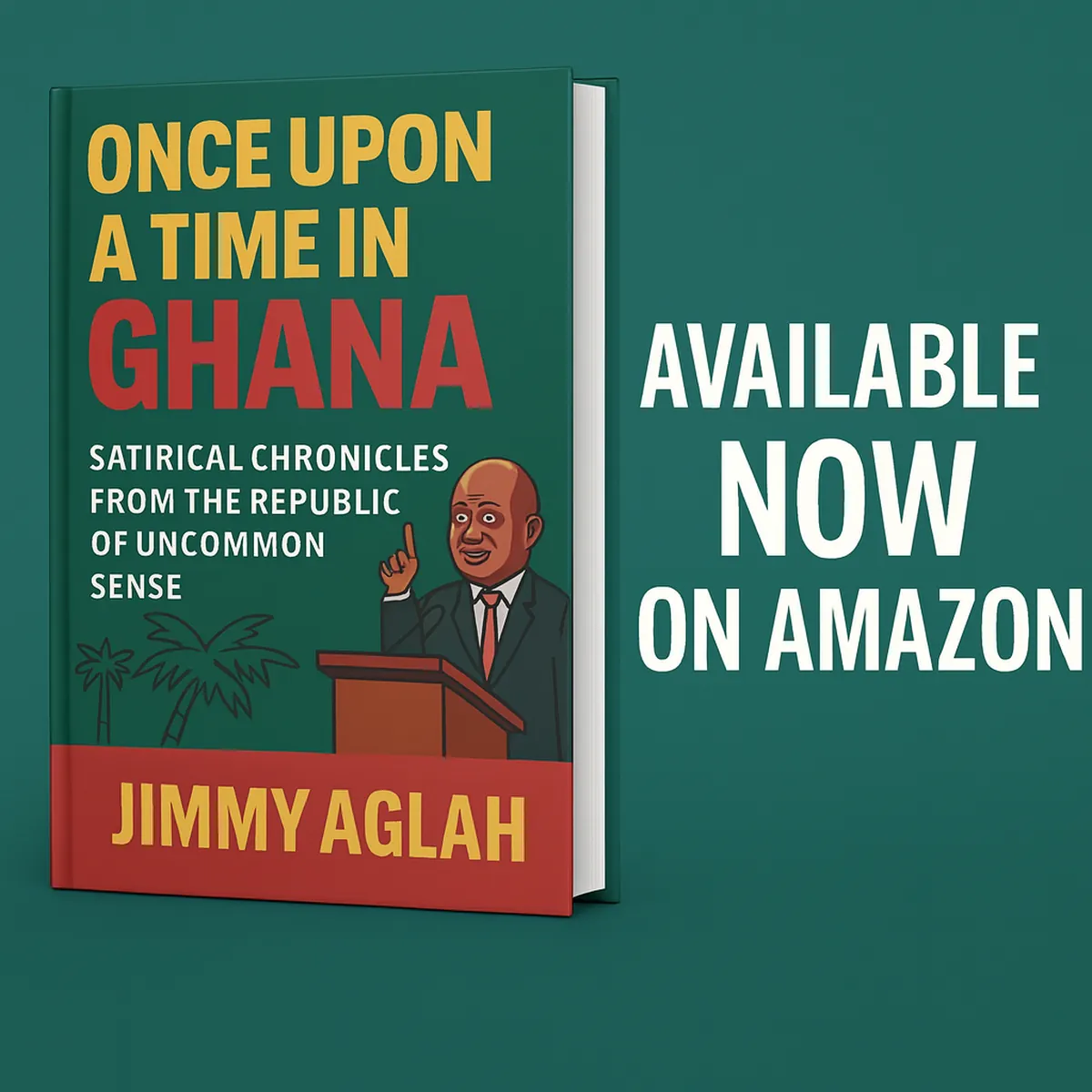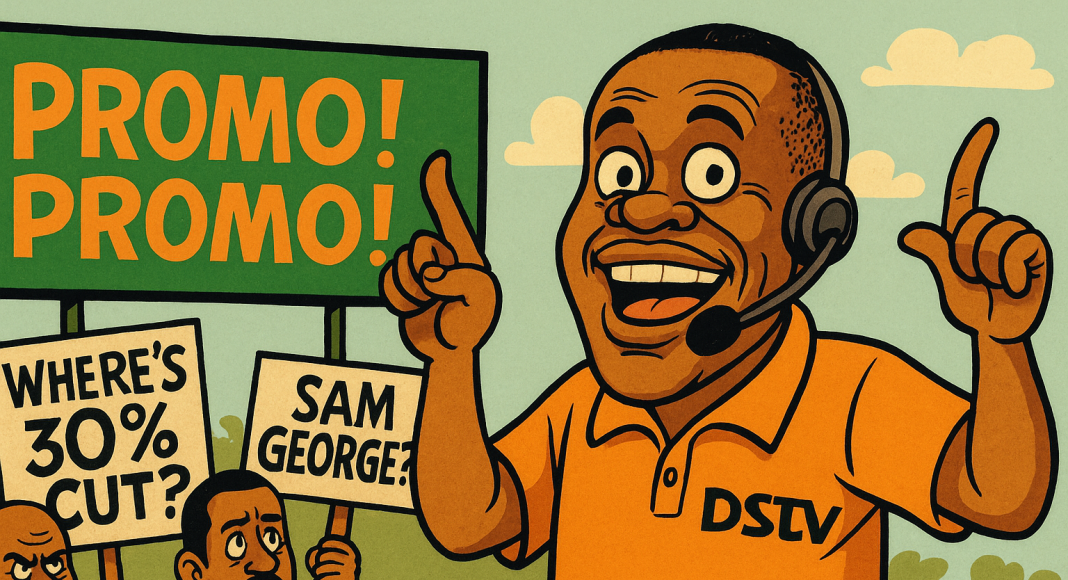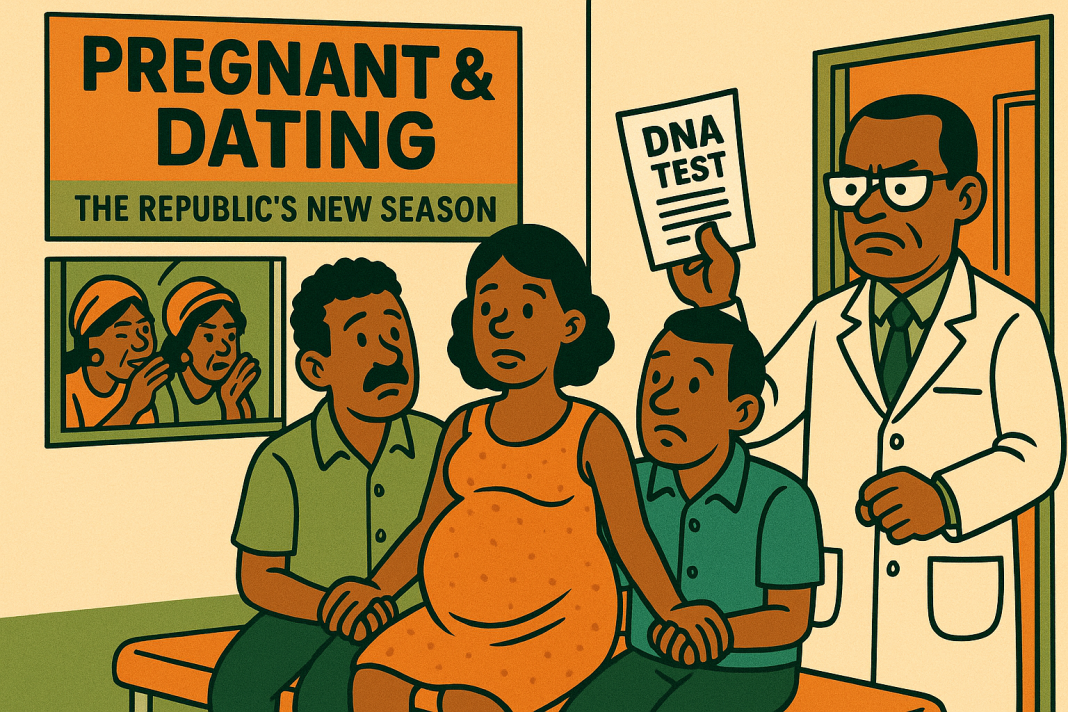
Once upon a time, Hon. Sam Dzata George unsheathed a sword of regulation and marched on the DSTV palace, demanding a 30% tribute in the name of Ghanaian households. Football lovers clapped, parents exhaled, and price-weary families cheered as if daylight had finally reached the decoder. The Republic set a reminder for the day the invoice would wear a smaller shoe.
Then came the turn. Instead of parading a line-item victory, the Minister re-emerged with flyers. The announcement was crisp: “DSTV has unveiled new, exciting packages.” Somewhere between ultimatum and update, the warrior’s sword turned into a brochure. And the Republic asked, with a proverb: “When a frog jumps in broad daylight, is it chasing a title—or running from hunger?”
Sam George DSTV Ghana 2025: Three Hilarious Truths
1) Optics beat decimals
Committees, timelines, and spreadsheets may yet deliver reductions, but optics are already at full-time. The public remembers the thunder; what they see now is the thunderer cheerfully unveiling a company’s promos. In communications, what you hold up to the cameras often speaks louder than what you file in a committee cabinet. A one-page bill with a smaller total can silence a thousand posters.
2) The memes won the press conference
Social feeds were ruthless: a headset here, a branded polo there, and captions that sold faster than any bouquet. One viral quip captured the mood: “All that noise—just for DSTV marketing manager?” When citizens start supplying the punchlines, the press release has already aged. Memes are the Republic’s auditors; they don’t collect taxes, they collect truth.
3) Regulators shouldn’t audition for brand ambassador
A regulator can champion consumers without performing Customer Care on stage. The line is delicate but visible: announce outcomes (a cedi figure on people’s bills), not offerings (bouquets with confetti). Until receipts change, households will treat every promo like a magician’s flourish—entertaining, but was that our coin or yours?
“Reduction” or “Promo”? The Compact/Compact+ Tangle
Now to the heart of the confusion—served hot with extra semantics. In the Republic’s street parliament, taxi drivers, hairdressers, students, and accountants all became pricing philosophers overnight. Why? Because two microphones told two different stories, and both waved happily to the same cameras.
Version A (as many heard from the Minister): If you are on Compact+ paying GHS 570, from October 1 you could simply downgrade to Compact (GHS 380) and still be upgraded automatically back to Compact+. In short: “pay less, enjoy more.” The crowd shouted hallelujah and sharpened their WhatsApp fingers.
Version B (as many read from DSTV Ghana’s side): If you are on Compact+, continue to pay the same GHS 570 from October 1 and you’ll be upgraded to Premium (normally GHS 865). In short: “pay the same, enjoy more.” The same crowd paused. “Which is which?” asked Auntie Akosua at the waakye joint. “Are we going up by going down, or going up by staying up?”
These are two entirely different routes to the promised land. The first invites a mass downgrade (citizens paying less for more); the second avoids a stampede (citizens pay as before, get a temporary leap in channel status). Somewhere between microphones, commas, and committees, clarity went missing like a remote control in a living-room sofa.
At the press conference, the Minister—seeking to settle doubts—asked a straight question to a MultiChoice boss: “Do you agree with everything I’ve put out?” A confident “Yes” floated into the microphones. But the Republic has learned the difference between a “Yes” on stage and a “Yes” on the invoice. If Version A truly stands, then on October 1 thousands could legally downgrade to Compact for GHS 380 and still be auto-upgraded to Compact+. Clever, lawful, and devastating—for anyone budgeting on the assumption that customers never read the fine print.
Why might DSTV’s messaging lean toward Version B? Simple: avoiding a tidal wave of downgrades. As any trotro mate will tell you, if the conductor shouts “Pay less and sit in first class,” expect a national stampede. Meanwhile, the Republic remembers earlier promos (January–March 2025) where Compact users who paid up to Compact+ then got bumped to Premium—but existing Compact+ and Premium subscribers were excluded because there’s no free level beyond Premium. Promotions come and go; clarity should not.
The People’s Calculator vs. The Promo Brochure
In the chop bars, calculators are out. “If I can already downgrade any time for economic reasons,” asks Kwaku Accountant, “why won’t I downgrade on October 1, pay less, and still enjoy more?” If that door is truly open, then it is not just a promo; it’s a pilgrimage. But if the door is closed—and the stage “Yes” was more polite than precise—then the public expects the same thing they demand from preachers and providers: show us the receipts.
The cleanest path forward is not another microphone duel; it is publication of the agreement text. The Minister himself floated that idea: release the terms (redacting trade secrets) so households can understand what they qualify for and when. The Republic does not fear long documents—only long bills.
Prescriptions from the Republic
- Publish the pact: Release the committee agreement—summary table, eligibility rules, dates, and examples. Clarity kills confusion faster than any tweet.
- Bill-first communication: Lead with what changes on the invoice, not what glitters in a brochure. “Your charge will be X less” beats “Your experience will be richer.”
- One microphone, one math: If the Minister says A and the provider says B, Parliament will cook Jollof; households will eat confusion.
- Frog Test 2.0: Before any announcement, ask: “If this jumps in daylight, will people think I’m chasing a title or running from hunger?” If unsure—don’t jump.
- Time-boxed promos: If upgrades are promotional, stamp them with dates and clear reversion rules. Surprises belong in soap operas, not in billing cycles.
- Consumer simulator: Publish two or three worked examples (Compact → Compact+; Compact+ → Premium) with exact figures. Numbers calm nations.
Curtain Call
The elders say, “He who fights for the people but eats with the company will soon chew both bones and insults.” Perhaps the reductions will come; perhaps the frog will finally land in clean water. Until then, the Republic will keep its decoder on mute and its satire on loudspeaker. As for the Sam George DSTV Ghana 2025 episode, it has taught one enduring truth: Ghana doesn’t only watch television—we watch politics like a series. And yesterday’s episode came with a laugh track.

📖 Love this satire?
Dive into Once Upon a Time in Ghana: Satirical Chronicles of Uncommon Sense—a collection of wit, wisdom, and wicked humor for these interesting times.
🔗 Related (internal): Ghana’s “chocolate rivers” and the politics of excuses
🔗 Background (external): Reuters: Ghana threatens to suspend DSTV licence over prices









